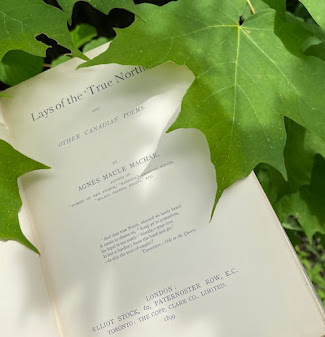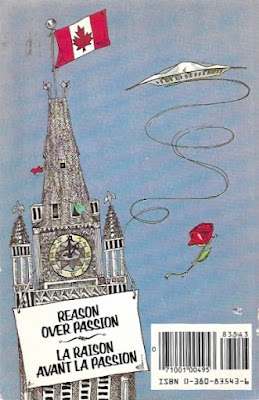01 July 2022
Verse by the First of Dominion Poetesses
27 June 2022
E.T. Cash In
Jude Waples
New York: Avon, 1983
93 pages
Most embarrassing.
 |
| I Never Promised You a Rose Garden Michelle Le Grand and Allison Fay Don Mills: Greywood, 1972 |
 |
| Frog Fables & Beaver Tales Stanley Burke and Roy Peterson Toronto: J Lewis & Samuel, 1973 |
According to the 26 May 1983 edition of the Ottawa Citizen, Jude Waples was provided the quotations, and found them "scary." "I was careful to make sure none of the quotations weren't used out of context," she told journalist Kathleen Walker.
I'm not convinced, though given current times, I found this one particularly interesting.
Nine years ago, I described P.E.T.: Pierre Elliott Trudeau and his unearthly adventures as the ugliest Canadian book cover of all time. The interior isn't any prettier, though I've experienced far uglier things between the covers.
Perhaps.
There's no way P.E.T. wasn't a rush job. As exploitation product goes, I like it just as much as this strange Montreal MusicWorks single, which somehow went gold in Canada:
Full disclosure: I voted Liberal in 1988. Not sure about 1997.
The Library of Parliament, Library and Archives Canada, Bibliothèque et Archives nationales du Québec, and five of our university libraries hold copies.
24 June 2022
'La Fête nationale' par Léon Lorrain
 |
| Léon Lorrain 1855 - 1892 RIP |
Vingt-quatre juin! Salut! ― Ô fête solennelle!Apporte dans nos cœurs l'amitié fraternelle,Ce sentiment si beau qu'on le dit surhumain!Retardez votre cours, heures patriotiques!Laissez-nous savourer les plaisirs pacifiquesDont vous semez votre chemin!Le soleil radieux, comme un puissant génie,Répand à flots vermeils le jour et l'harmonie;Il féconde nos champs de ses subtils rayons;Il dispense partout dans sa course enflamméeLa vie et l'abondance; une brise embauméeS'élève de nos frais sillons.Notre libre drapeau flotte, au gré de la brise,Au sommet d'une tour, au clocher d'une égliseEt domine nos champs, ― resplendissants tableaux! ―Sous ses replis mouvants, l'enthousiaste fouleSe rallie et se presse, ensuite se dérouleOndulante comme les flots!Tous les cœurs sont émus par la même pensée.Voyez se réunir cette foule empressée.Elle confond ensemble, en ce jour patronal,Au seuil du temple saint où souvent elle prie,L'amour du Tout-Puissant, l'amour de la patrie,Dans le devoir national!IIDu ciel où vous vivez, de ces célestes dômes,Esprits de nos aïeux, ô bien-aimés fantômes,Venez contemplez vos enfants.Dans le ravissement leur âme se déploie;Leur chère liberté, le bonheur et la joieBrillent sur leurs fronts triomphants!Voyez qu'elle sied bien à leur tête ennoblie,La couronne de fleurs que vous avez cueillie, ―La couronne de liberté!Ils ne l'ont pas flétri, ce lys emblématique;Mais ils l'ont cultivé de leur main héroïqueComme on cultive un fruit d'été!
20 June 2022
Good Times Never Seemed So Good
Caroline
André Norton and Enid Cushing
New York: Tor, 1983
320 pages
Caroline was published in January 1983, eight months before Enid Cushing's death. Her passing was not recognized by the Montreal Gazette, her hometown's surviving English-language daily, though the family did publish an obituary in the 30 August 1983 edition.
It's no surprise that the Gazette gave Enid Cushing's death no notice; the paper paid little attention to her writing career. Not one of her murder mysteries – Murder’s No Picnic (1953), Murder Without Regret (1954), Blood on My Rug (1956), The Unexpected Corpse (1957), and The Girl Who Bought a Dream (1957) – was reviewed in its pages. The same holds true for the titles she penned in her late-in-life resurrection as a writer of historical romances: Maid-At-Arms (1981) and Caroline (1983).
My interest in Enid Cushing began with the discovery of her 'fifties Montreal mysteries, but I'm much more intrigued by her two romances. Both Maid-At-Arms and Caroline are collaborations with celebrated American science fiction writer Andre Norton (aka André Norton; née Alice Mary Norton). While I've not been able to discover how the two came to work together, I have learned that their friendship dates back to at least 1953, the year Murder's No Picnic was published.
Maid-At-Arms stands with Rosemary Aubert's Firebrand as my very favourite Canadian romance novel. Caroline is a close third.
Caroline is a well-written, well-crafted novel; the headache-inducing sentence in which Richard is introduced is an anomaly. Given Enid Cushing's awkward mystery novels, one might conclude that Norton's name deserved place of prominence, but I argue otherwise. Norton had no connection with Canada, never mind Montreal – and Caroline is very much a Montreal novel. The action takes place over little more than twelve months in the city's history. Beginning in January 1847 with Lord Elgin's arrival, it incorporates the Summer of Sorrow and the opening of the Montreal & Lachine Railroad, ending in the early months of 1948. Throughout it all, I kept an eye out for historical inaccuracies, yet spotted nothing. I doubt credit goes to Norton, just as I doubt Norton, a science fiction novelist from Cleveland, Ohio, came up with the idea of a historical romance set in mid-nineteenth-century Canada. It's unlikely Caroline will ever be reprinted, but if it is, let's give Enid Cushing equal billing.
 |
| Adolphus Bourne, Map of the City of Montreal, 1843 (detail) |
Object and Access: A decaying mass market paperback. The cover illustration is by New Brunswicker Norm Eastman, best known for men's magazine covers like this:
 |
| New Man, October 1968 |
I purchased my copy last year for US$5.79 from an Ohio bookseller.
As far as I can tell, not one Canadian library holds a copy.
13 June 2022
An Old Novel of Misspent Youth
Jeann Beattie
Toronto: Ryserson, 1950
353 pages
He's probably right. Both were hired to fill in for guys fighting overseas.
We heard later he had been killed in his first bombing mission. When I told Reed she sat silently in the chair, her body rigid, her eyes deepened to black and her face white. "Poor baby," she said "poor baby."An unanticipated thaw sets in when Reed meets tall RAF officer Lauri Conroy. She's smitten, even though he treats Reed much as she'd teated her admirers. Eventually, Lauri returns to Europe, leaving her very weepy. On the rebound, Reed lands on moody John Schaeffer. When he comes out as a communist, the slow-moving story shifts to a stuttering crawl as Jan, Reed, Tim, Pete, and John discuss political philosophy and theory. They do this in letters, at restaurants, at parties, at each other's flats, on the street, and atop 30 Rockefeller Center. Really, the dialogue isn't much different after John is introduced, there's just more of it. Consider this early example, from Jan and Reed's first double-date with Tim and Pete:
The most interesting and atmospheric passages in the novel involve Jan and Reed's early days in New York, but like everything else, descriptions of the city and its culture soon give way to conversations about communism. The worst of it comes when Jan, Reed, Tim, and Pete visit to a "celebrated live joint on Second Avenue where one might hear the pure jazz." Once seated, they offer a tired-looking elderly man a place at their table. No jazz "enthusiast," he'd entered the club only to warm up. He too has thoughts on communism, which is shared over the course of six pages.
Here are two. Feel free to skip. There will be no test.
It's all so exhausting. Dinner parties are ruined by page after page of back and forth bickering between John, the communist, and Jan, the champion of liberalism. Reed is too late in standing up to it all:
"Let's not talk about Communism or Democracy or any other political belief any more. You two argue, but you never convince each other. So... let's just stop talking about it."
But it doesn't stop, dragging on long after John and Reed are through. After their break-up, Pete invites Jan, Reed, and Tim to yet another dinner at his apartment. "I take it," Reed says, "that we are to talk Communism."
"More intellectualizing?" Tim said with a yawn."Who's intellectualizing? Pete's eyebrows lifted. "Although I was thinking of the last conversation we had before this fireplace.
"That's right," Tim took out his pipe and began to fill it.
"We settled it all nicely as I recall. There were some high-flown phrases I still don't get, but we tied up things. Now what shall we discuss? Books? The theatre?
"Certainly not," Pete dug deeper into his chair. "As I recall we approached it from a psychological angle."
"Approached it, " Tim groaned, "All right Socrates, make with the words. Don't leave us hanging..."
Blaze of Noon was Jeann Beattie's first novel. Published when she was twenty-eight, it reads like the work of an even younger writer, less seasoned writer. It captures something of the curiosity and earnestness of youth, but little of its passion. Books? The theatre? Do any of these people have no interests outside political philosophy?
 |
| Regina Leader-Post, 21 October 1950 |
Given last month's leak in the republic to the south, the most timely novel of 1950 may be Margaret Millar's Do Evil in Return.
How I wish it was otherwise.
Access: Held by Library and Archives Canada, Bibliothèque et Archives nationales du Québec, the Kingston-Frontenac Public Library, and six of our academic libraries. As of this writing, one copy – one – is listed for sale online. A Very Good copy lacking dust jacket, at US$15.00 it seems a deal.
06 June 2022
Accidents Never Happen in a Perfect World
03 June 2022
Reading Writing About Richard Rohmer
Lieutenant-General Richard Rohmer's commanding countenance graces the cover of the new issue of Zoomer, just now hitting the stands. A cover boy at 98, his appearance owes something to Her Majesty's Platinum Jubilee. In the corresponding article, "A General Fit for a Queen," Ian Coutts writes of Rohmer's decades-long relationship with our monarch, his life, his various careers, and his bestselling thrillers.
I'm honoured to have been interviewed for the piece. An elementary school discovery, Richard Rohmer was my very first favourite Canadian author. Eight years ago, with pals Chris Kelly and Stanley Whyte, I resolved to read every single one of his books. We very nearly succeeded. The blog Reading Richard Rohmer documents our adventure.
Richard Rohmer hasn't published a new book since 2007's Ultimatum 2. And so, I was excited to read this in Ian's article: "As we wind down the interview, Rohmer hands me the dazzling, fiery abstract cover design for the non-fiction book he is working on, about high air temperatures in the Rockies and melting permafrost."
How's that for a teaser?
Long live the queen!
Long live the general!






























